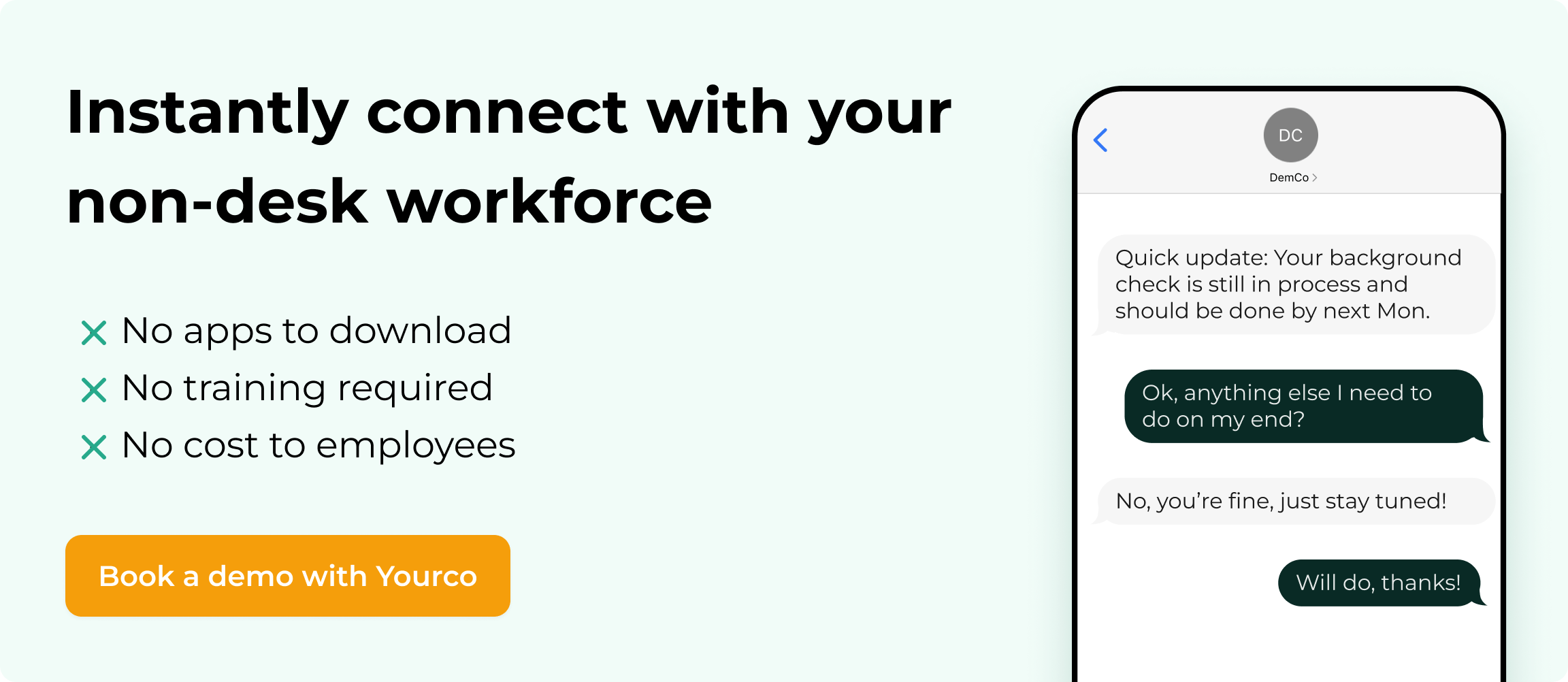Text Your Employees Professionally: A Guide to Workplace SMS


When people receive too many notifications about less-important matters, they start tuning them out. For frontline teams in manufacturing, construction, or warehousing, traditional communication methods create significant challenges since these employees often lack company email addresses, reliable internet access, or the time to check messages during their shifts. Texting offers a direct alternative that reaches employees instantly, without requiring app downloads or internet connections.
Still, many HR and safety leaders ask the same question: ‘’Is texting employees considered unprofessional?’’ This guide explores that debate and shows how organizations can use texting responsibly, striking a balance between professionalism, compliance, and accessibility in their communication.
Understand What Makes Communication Unprofessional
→ Download our free Internal Communication Audit Survey Template to start collecting employee feedback and improve communication across your organization.
The word "unprofessional" refers to anything that doesn't meet the expectations or standards of a certain profession or workplace. This highlights the importance of setting clear communication expectations and respecting employees' boundaries.
When it comes to what is considered unprofessional, context matters. One of the most commonly-identified unprofessional behaviors is not respecting others' boundaries. This applies to in-person interactions as well as digital communication like texting.
Professionalism depends on the workplace environment. While desk-based employees typically rely on company email addresses, frontline workers often lack email access. For these teams, texting is the most appropriate and professional form of communication. When used properly for policy updates, weather concerns, or workplace hazards, texting maintains the same professional standards as any other business communication channel.
Always respect how employees want to be contacted. Some may prefer texts, others email, or another method entirely. With Yourco, you can quickly gather feedback through SMS to learn how employees prefer to receive updates and how well your current channels are working. The insights help you adjust your communication strategy and keep everyone informed in the way that works best for them.
Use Texting to Reach Your Team Effectively
Text messaging offers several advantages when managers need to reach their teams quickly. People read texts almost immediately. Research shows that 98% of text messages are read, compared to just 20% of emails. The average response time is around 90 seconds.
For frontline teams, texting solves accessibility challenges that email cannot. Manufacturing floor workers, delivery drivers, warehouse staff, and construction crews rarely sit at computers. They may not have company email addresses or regular internet access. Text messaging reaches them where they are, on devices they already carry.
Next, let's take a closer look at when and how to text employees in a professional manner.
Respect Employee Boundaries When Texting
Before sending a text message to one or more employees, keep in mind that most people's devices will notify them when they receive a message, whether it's urgent or not. When employees are off the clock, it's best to respect their personal time. Managers should resist the urge to send that text in the evening when it's on their mind. If the information's important, consider a scheduled send instead.
A platform like Yourco makes it easy to text employees while respecting their boundaries. With scheduled messaging capabilities, you can compose messages when convenient and set them to send during work hours or designated break times.
Know the Best Practices About After-Hours Contact
There’s no specific rule in the U.S. that prohibits reaching out to employees after hours. Still, it’s best to give your team the freedom to decide whether to reply right away or wait until their next shift. Setting clear communication guidelines shows that you respect their personal time and helps maintain a healthy work-life balance.
Keep Your Messages Simple and Clear
The best way to ensure that you don't cross into unprofessional territory is to keep things simple and clear. With texting, there is always the possibility that one or more recipients might misinterpret a message, either its contents or the tone. To reduce the chance of misunderstandings, only text employees when necessary and when it won't take them away from their work.
Send the Right Messages at the Right Time
If you're going to send a text message to your employees, make sure you have a compelling reason. Here are some of the top ways text messages can be used effectively:
- Company Announcements – Send or schedule HR announcements, executive updates, and managerial information to reach all employees instantly.
- Employee Alerts – Send notifications related to schedule changes, emergency situations, compliance requirements, safety updates, and more.
- Time-Off Requests – Make it easy for employees to request time off without requiring them to call in or navigate online systems.
- Surveys and Feedback – Gather real-time employee feedback through SMS-based polls and surveys that drive higher participation than email.
- Onboarding – Share welcome messages, training materials, and first-day logistics with new hires via text.
- Safety Communication – Distribute toolbox talks, hazard alerts, and incident reporting through a channel employees actually use.
Yourco's platform supports all of these use cases and more, with features specifically designed for frontline workers.
Follow Professional Texting Etiquette
Texting etiquette refers to a basic set of rules for what is and isn't appropriate within a given situation. While texting etiquette can cover a wide range of best practices as well as things to avoid, it mainly comes down to two questions:
1. Is this important or urgent?
Especially for frontline employees, consider whether the message you're about to send is necessary to send right now. If it's not, you can schedule a message to be sent out when employees are available. If you get into the habit of sending too many texts of varying importance, employees may start tuning them out, feeling like their time isn't being respected.
2. Is there any chance this can be misunderstood or misinterpreted?
The easiest way to maintain professionalism when texting employees is to keep your messages clear, concise, and actionable. Know that the priority for employee texting isn't necessarily to be creative or witty. It's to deliver impactful information in a way that prevents misunderstandings. Don't be overly casual or use emojis, as many people consider them unprofessional.
When it comes to professionalism, perception is reality. This means it doesn't really matter what you meant to say or how you meant to express it. If it could come across as unprofessional, you should rethink what you're about to send.
Communicate Professionally with Yourco
When done right, texting employees can be an effective and professional way to communicate. Yourco's SMS-based platform makes it easy to reach frontline employees with important updates, safety alerts, scheduled reminders, and more.
Yourco offers two-way communication that lets employees respond to messages, ask questions, and provide feedback. With AI-powered automatic translations in 135+ languages and dialects, every employee receives messages in their preferred language without any manual effort from managers. The platform logs all communications for compliance and audit purposes, creating the same "paper trail" that makes traditional methods valuable, while delivering the immediacy and accessibility that frontline teams need.
Features like message scheduling, audience segmentation, and secure document sharing ensure your communication remains professional and effective. Yourco integrates with 240+ HRIS and payroll systems, making implementation straightforward for organizations of all sizes.
To learn more about how Yourco's platform works for frontline teams, try it for free or contact us for a demo.
Frequently Asked Questions
Is texting employees less professional than email?
No. Professionalism depends on the workplace context. While traditional methods work well for desk-based employees, texting is often the most appropriate and professional way to reach frontline workers who lack email access or spend their days away from computers. When used with clear policies and purpose-built platforms like Yourco, texting is a highly professional communication channel.
Can I text employees after work hours?
While there's no U.S. law prohibiting after-hours texts, it's best practice to respect employees' personal time. Use scheduled messaging to send texts during work hours or designated break times. This demonstrates respect for work-life balance and prevents communication fatigue.
How do I maintain professionalism when texting employees?
Keep messages clear, concise, and actionable. Avoid overly casual language or emojis. Only send texts when necessary and ensure the information is relevant to recipients. Using a dedicated business texting platform like Yourco helps maintain professional standards by providing message templates, scheduling capabilities, and compliance features.
What should I do if employees stop responding to texts?
If engagement drops, review the type and timing of your messages. You may be sending too many updates, or the content may not feel relevant. Try mixing in short polls or feedback requests to re-engage employees and show that communication goes both ways. Consistency, respect for time, and clear value in each message will help restore responsiveness.





